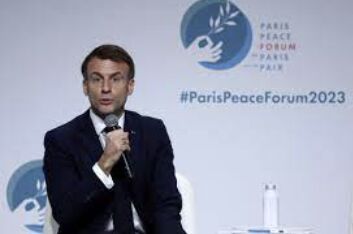Macron Urgently Calls for Global Action on Melting Glaciers: A Wake-Up Call for Humanity's Survival
French President Emmanuel Macron emphasizes the urgent need for global cooperation to address the devastating effects of melting glaciers and climate change at the Paris Peace Forum.
French President Emmanuel Macron has called for urgent global cooperation to address the devastating effects of climate change, specifically highlighting the unprecedented challenge posed by melting glaciers. Speaking at the Paris Peace Forum, Macron emphasized the impact of melting ice on various global issues, including biodiversity, rising sea levels, water scarcity, migration, CO2 emissions, and the risk of pandemics.
Despite ongoing conflicts such as the war in Ukraine and the Israel-Hamas conflict diverting international attention, Macron stressed the need for unity and collaboration. He stated that the collapse of the cryosphere, which includes glaciers, represents a major threat to humanity. The melting of ice surfaces worldwide not only affects biodiversity and coastlines but also exacerbates water scarcity, promotes greater CO2 emissions, and increases the risk of new pandemics.
Macron's call for urgent cooperation comes at a time when conflicts are once again at the forefront of global concerns. However, he urged leaders to work closely together in a peaceful manner despite these fragile relations. The Paris Peace Forum saw the participation of heads of states, governments, and diplomats from approximately 40 nations, including China. Notably, Russia was not invited to the summit, although it shares Arctic territory. The summit resulted in a call to action to address human-caused climate change, highlighting the loss of biodiversity caused by melting ecosystems.
Additionally, a high-level group was launched to focus on the impact that melting ice will have on coastal towns facing rising sea levels and dwindling water resources in mountainous regions. Ruth Mottram, a climate scientist, welcomed the call for scientific collaboration in the polar regions but acknowledged that Russia's conflict with Ukraine has disrupted such efforts. She emphasized the importance of understanding the Earth system as a whole, as the loss of glaciers and ice sheets will have far-reaching impacts on vulnerable populations.
Miriam Jackson, a climate scientist at the International Centre for Integrated Mountain Development, called on politicians to listen to scientists and take the necessary actions to mitigate the impacts of melting glaciers. The effects of melting glaciers are felt through rising sea levels, floods, and unpredictable river flows, affecting billions of people. Jackson emphasized the collective responsibility to slow down and reverse these changes. Studies have shown that glaciers in mountains ranging from the Alps to the Himalayas are disappearing rapidly due to warming temperatures.
Many are predicted to vanish entirely by the end of the century. While the loss of glacier mass is irreversible in the short term due to human-caused climate change, scientists believe that substantially reducing the burning of fossil fuels could help minimize future melting. The situation is equally concerning at the Earth's poles. The Arctic is losing sea ice at an alarming rate, while the frozen Antarctic is experiencing dramatic ice sheet melt, disappearing glaciers, and unusually high temperatures.
Macron's call for global cooperation and his emphasis on the urgency of addressing melting glaciers reflects the recognition of the significant threats posed by climate change. The need to prioritize collaborative and peaceful actions is essential in combating these dangers and safeguarding the future of humanity.




